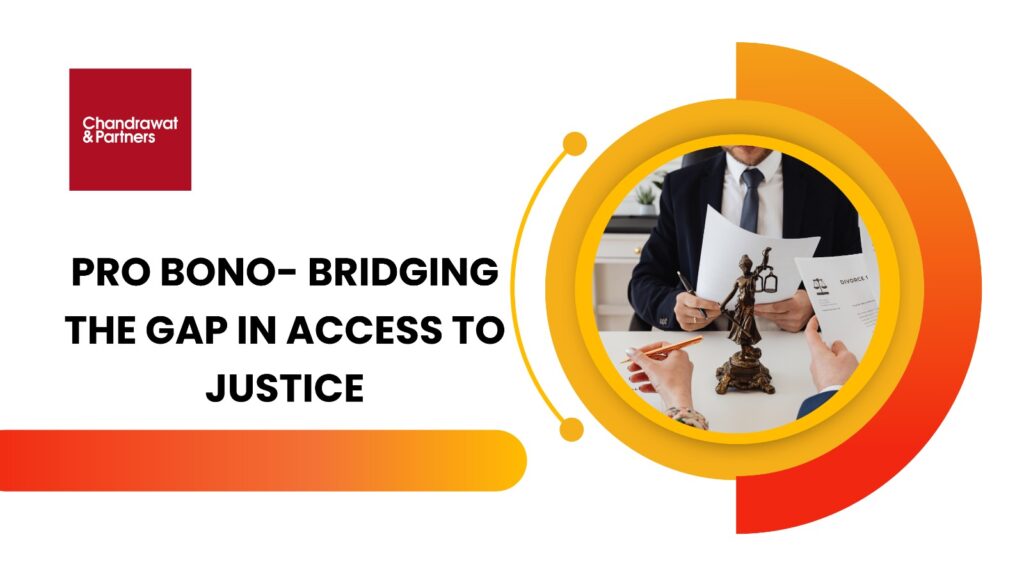Pro bono: Bridging the gap in access to justice.
Pro bono, a Latin term meaning “for the public good,” refers to legal work performed voluntarily by lawyers and advocates for those who cannot afford to pay for legal services. Pro bono work has gained significant importance in recent years, especially in developing countries like India, where access to justice is limited for most of the population.
In India, the legal profession has been dominated by a small group of individuals who are experts in the field and are often unaffordable for the average population. This has resulted in a vast gap in access to justice, particularly for those who belong to marginalized communities, including women, children, and lower-income groups.
The significance of pro bono work in Indian society
The importance of pro bono work in India cannot be overstated. It refers to providing a valuable service to those who cannot afford legal representation and helps to ensure that everyone has access to justice. The work of pro bono lawyers is essential in addressing the legal needs of the most vulnerable members of society, who are often not able to seek or receive legal assistance due to a financial crunch. Pro bono work also addresses the imbalance of power between legal professionals and the public and strives to promote the principles of fairness, equality, and access to justice for all.
The concept of pro bono work has been gaining importance in recent years in India as awareness of access to legal services for the underprivileged and marginalized sections of society has increased due to it becoming a pressing matter. There are several reasons why pro bono work is important in India, some of which are listed below:
- Approach to justice:
Pro bono work helps to ensure that individuals who are unable to afford legal services are still able to get easy access to justice. This is especially important in India, where many people are unable to pay for legal representation and are unaware of their legal rights or the way to protect and uphold them.
- Assisting justice:
Pro bono work helps to bridge the gap between those who have access to legal services and those who do not, thus promoting equality and fairness in the legal system, which in turn leads to a more aware society.
- Fosters a sense of social responsibility:
Pro bono work encourages lawyers to utilize their skills and expertise and give back to the community while contributing to the greater good. This fosters a sense of social responsibility among lawyers and advocates and promotes the ideals of public service and professionalism.
- Providing legal aid:
Pro bono work helps to provide legal aid to those who need it most, including individuals and communities that are highly affected by poverty, discrimination, and human rights violations.
Access to pro bono
In recent years, the Indian government has taken various steps to improve access to justice for all citizens of the country. In pursuance of the same, a National Legal Services Authority has also been established, which provides free legal services to eligible individuals and groups. However, despite these efforts, there is still a significant gap in access to justice for many people in India, and pro bono work is ideally the answer to filling this gap. Pro bono not only gives access to justice to the unaware and the financially backward sections of society but also enables lawyers and advocates to build upon their reputation in society by providing legal assistance to those in need.
In India, pro bono legal services are typically offered to individuals and communities that are unable to afford legal representation and need assistance. This may include people living in poverty, marginalized communities, and those who have been affected by human rights violations. Additionally, pro bono services may also be offered to non-profit organizations, such as NGOs and community-based organizations, that work for the welfare of disadvantaged communities.
Legal backing for pro bono services
- The Constitution of India, by virtue of Article 39 A, directs that the state shall provide free legal aid to the poor and weaker sections of society to promote justice based on equal opportunity.
- Articles 14 and 22 (2) of the Constitution of India ensure equality before the law.
- The United Nations Sustainable Development Goal 16 underscores the obligation of states ‘to ensure equal access to justice for all’.
- Keeping in line with these obligations and with a view to encourage pro bono legal services, the Department of Justice has identified and taken initiatives to create a database of lawyers willing to provide their services to those in need, provided they are identified under Section 12 of the Legal Services Authority Act of 1987.
Conclusively, pro bono work in India is of vital importance in ensuring that everyone has access to justice. It is a way for lawyers to give back to their communities, to help those who cannot afford legal services, and to promote the principles of fairness and equality in the legal system. With the increasing awareness of pro bono work and the efforts of the Indian government to increase access to justice, it is hoped that pro bono work will continue to play an important role in addressing the legal needs of the most vulnerable members of society.
For more information or queries, please email us at
enquiries@chandrawatpartners.com




